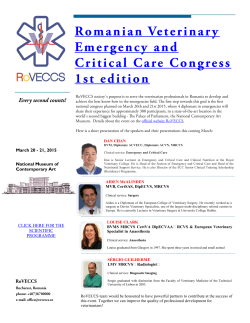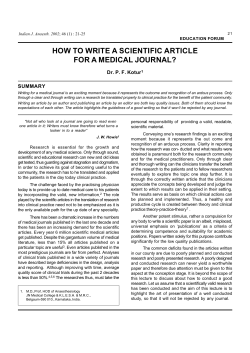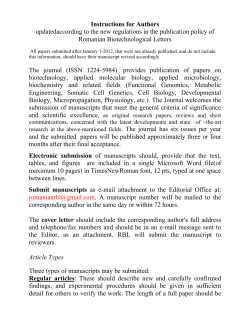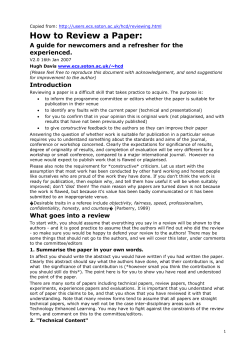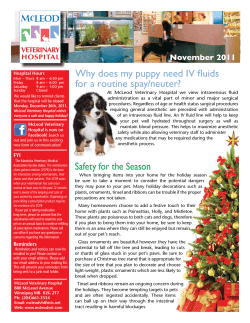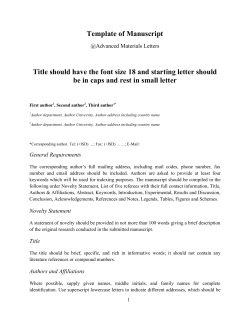
Guidelines for Authors
Guidelines for Authors guidelines West Indian Veterinary Journal 2009, 9 (2) 38-40 Guidelines for Authors The West Indian Veterinary Journal is a peer-reviewed journal published twice yearly by the School of Veterinary Medicine, The University of the West Indies, Trinidad and Tobago. The Journal accepts manuscripts on all aspects of veterinary and human medicine and public health. Manuscripts are accepted for consideration provided that neither the complete article nor any part of its essential substance, including, tables or figures has been or will be published or submitted elsewhere before appearing in the Journal. Abstracts or press reports published in connection with scientific meetings are exempted from the above limitation. Manuscripts can be submitted as Original articles, Reviews, Case reports, Short communications, or Letters to the Editor. Original Articles cover scientific reports from original basic or clinical research, and may include intervention studies, cohort studies, case-control studies, epidemiologic assessments, and other observational studies. Each manuscript should state clearly the objective or hypothesis, the study design and methods, the essential features of any interventions, the outcomes or results of the study, and a discussion section placing the results in context with the published literature. Review Articles provide systematic, critical assessments of the literature and data sources pertaining to special scientific or clinical topics, and are designed to bring the reader up to date on the state of knowledge in the subject area under review. Clinical reviews should emphasize clinically germane factors such as cause, diagnosis, prognosis, therapy, or prevention. Review articles are usually solicited by the editors, but the Journal will consider unsolicited material. Brief Reports (Case Report, Short Communications) are short reports of original studies or evaluations, and may include unique, first-time reports of clinical case series, but should not exceed 1200 words in length, including abstract, tables, figures and references. Letters to the Editor may present short practical and unstructured observations from veterinary practice, or comment on material and issues published in the Journal. Letters to the Editor will be considered for publication (subject to editing and abridgment) provided they do not contain material that has been submitted or published elsewhere. Where animals have been used in a study, the animal welfare authority under which the work was done must be stated. Give the authorisation reference number where known. Circumstances relating to animal experimentation must meet the International Guiding Principles for Biomedical Research Involving Animals as issued by the Council for the International Organisations of Medical Sciences. These guidelines are obtainable from: The Executive Secretary, C.I.O.M.S., c/o WHO, Appia, CH-1211 Geneva 27, Switzerland, or at the following URL: http://www.cioms.ch/publications/guidelines/1985_texts_of_guidelines.htm The Journal will reject any paper where there is reason to believe that animals have been subjected to unnecessary or avoidable pain or distress. Manuscript Style Manuscripts should be typed double-spaced using 11- or 12-point font size, with the right margins unjustified and submitted preferably as an electronic document (Microsoft WORD doc. They should be organized as follows: Title page, abstract, text, references, and as appropriate, figures and figure legends, and tables. The Title Page should include the full names, highest academic degrees, and affiliations of all authors. If an author’s affiliation has changed since the work was done, the new affiliation should be listed also. The “Corresponding author”, his/her e-mail address and telephone number should be identified on the title page. Abstracts should contain no more than 300 words and should briefly describe the problem being addressed in the study, how the study was performed, the salient results, and what the authors conclude from the results. The abstract must reflect the 38 • West Indian Veterinary Journal, 9 (2) December 2009 Guidelines for Authors contents of the manuscript, and information that does not appear in the text of the manuscript should not be reported in the abstract. Manuscripts should be prepared in conformity with the “Uniform Requirements for Manuscripts Submitted to Biomedical Journals” (Vancouver Style) as published by the International Committee of Medical Journal Editors and available at their Web Site http://www.icmje.org/index.html. References should be cited in the text with numbers in superscript4, and numbered consecutively in the order cited in the text, including those first cited in tables or figures. All authors should be listed when there are six or fewer; when there are seven or more, list the first six, followed by “et al.” Examples of references: Journal article Smithline HA, Mader TJ, Ali FM, Cocchi MN. Determining pretest probability of DVT: clinical intuition vs. validated scoring systems. N Engl J Med. 2003 Apr 4;21(2):161-2. Journal article with multiple authors – list the first six authors followed by et al Gao SR, McGarry M, Ferrier TL, Pallante B, Gasparrini B, Fletcher JR, et al. Effect of cell confluence on production of cloned mice using an inbred embryonic stem cell line. Biol Reprod. 2003;68(2):595-603. Chapter in a book Goadsby PJ. Pathophysiology of headache. In: Silberstein SD, Lipton RB, Dalessio DJ. Wolff’s headache and other head pain. 7th ed. Oxford, England: Oxford University Press, 2001: p.57-72. Conference paper Christensen S, Oppacher F. An analysis of Koza’s computational effort statistic for genetic programming. In: Foster JA, Lutton E, Miller J, Ryan C, Tettamanzi AG, editors. Genetic programming. EuroGP 2002: Proceedings of the 5th European Conference on Genetic Programming; 2002 Apr 3-5; Kinsdale, Ireland. Berlin: Springer; 2002. p.182-91. Sample reference from: http://www.nlm.nih.gov/bsd/uniform_requirements.html Electronic sources CD-Rom / DVD Collier L, Balows A, Sussman M, editors. Topley and Wilson’s microbiology and microbial infections [CDROM]. 9th ed. London: Arnold; 1998. Journal article on the internet Aylin P, Bottle A, Jarman B, Elliott, P. Paediatric cardiac surgical mortality in England after Bristol: descriptive analysis of hospital episode statistics 1991-2002. BMJ [Internet]. 2004 Oct 9 [cited 2004 Oct 15]; 329 (7470): 825. Available from: http://bmj.bmjjournals.com/cgi/content/full/329/7470/825 Homepage/Web site Cancer-Pain.org [Internet]. New York: Association of Cancer Online Resources, Inc.; c2000-01 [Updated 2002 May 16; cited 2002 Jul 9]. Available from: http://www.cancer-pain.org/. Sample reference from: http://www.nlm.nih.gov/bsd/uniform_requirements.html More sample references: http://www.nlm.nih.gov/bsd/uniform_requirements.html West Indian Veterinary Journal, 9 (2) December 2009 • 39 Guidelines for Authors Manuscript submission Manuscripts should be prepared electronically (using Microsoft WORD), and preferably submitted by e-mail to wivj@sta.uwi.edu. Figures may be inserted in the text file or attached separately. Complicated graphics and high resolution images are better attached separately. The manuscript must contain complete contact information for the corresponding author (postal address, e-mail address, and telephone and fax numbers). Copies of manuscripts can also be submitted electronically to – The Editor, West Indian Veterinary Journal, School of Veterinary Medicine, Faculty of Medical Sciences, The University of the West Indies, St. Augustine Campus, Trinidad – using one of the following addresses: Verrol.Simmons@sta.uwi.edu OR wivj@sta.uwi.edu For more information about the West Indian Veterinary Journal select the Journal link from the School of Veterinary Medicine homepage at: http://sta.uwi.edu/fms/vet. 40 • West Indian Veterinary Journal, 9 (2) December 2009
© Copyright 2025

